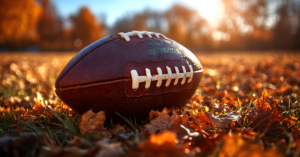
Rules, Rules, and More Rules
American football is famously rule-heavy. Everything from how a player can tackle to how a touchdown is scored is meticulously defined. This mirrors the U.S. legal system, where laws and regulations guide every aspect of civic life, from how contracts are signed to how justice is served. Compare this to other sports like soccer, which has fewer rigid rules and leaves more to the referee’s discretion. Soccer refs don’t have to worry about whether a player’s shin guard is precisely two inches wide; football officials, on the other hand, carry rulebooks the size of a law school textbook.
This obsession with rules reflects the American legal ethos: structure, clarity, and accountability. Just as every play is scrutinized to ensure it complies with regulations, every legal argument must align with statutes and precedents. It’s no surprise that Americans gravitate toward a sport that demands this kind of precision.
Referees as Judges
Football referees don’t just enforce the rules; they interpret them. Think of the line judges, back judges, and side judges as trial court judges, each responsible for specific aspects of the game. They observe the action, make calls based on their understanding of the rules, and sometimes huddle together like a panel of appellate judges to discuss tough decisions.
And then there’s instant replay—football’s version of an appeal. Coaches get a limited number of challenges, akin to filing an appeal in court. Some reviews, however, happen automatically, initiated by the booth (or, in legal terms, sua sponte by the “higher court”). Like a legal appeal, these reviews involve examining the evidence—frame by frame—to ensure the correct call is made.
This blend of strict rule-following and discretionary judgment mirrors the balance in the American legal system. Judges must adhere to the letter of the law but often exercise discretion in applying it to specific cases, much like referees interpreting whether a pass interference call was warranted.
The Players as Litigants
In American football, players and coaches don’t have unlimited power to question calls. They must pick their challenges wisely, knowing they’re limited to a set number per game. Similarly, litigants in court can’t appeal every ruling—they need strong grounds and, often, the resources to pursue it.
This dynamic contrasts sharply with sports in other countries. Take rugby, for example: referees have broad authority, and players rarely question their decisions. The American preference for controlled participation—where coaches can challenge but only within strict boundaries—reflects our cultural belief in structured, rule-bound fairness. We trust the system but still want a chance to advocate for our side.
Overtime: No Such Thing as a Tie
One of the most distinct features of American football is its aversion to ties. In the NFL, games go into overtime until a winner emerges. This gladiatorial nature mirrors our legal culture, where disputes must be resolved. The idea of leaving a courtroom—or a football field—without a definitive winner just doesn’t sit well with us.
Contrast this with sports like soccer or cricket, where ties are more acceptable. In those systems, the focus is often on the journey rather than the destination. Not in America. Our love of overtime shows our collective belief that every conflict, whether legal or athletic, demands a resolution.
The Gladiatorial Arena
Football’s appeal lies in its gladiatorial drama. Two sides enter the field (or courtroom), each armed with its strategies, evidence, and arguments. The battle unfolds, with referees (or judges) ensuring the contest stays within the bounds of fairness. The crowd, like a jury or gallery, watches intently, ready to cheer or jeer the outcome.
This theatrical element reflects the adversarial nature of the American legal system. Just as litigants present their cases in court, football teams leave everything on the field, trusting in the system to deliver a fair outcome.
Shaped by the American Mindset
Ultimately, football’s similarity to the legal system reflects broader American values. Our culture prizes fairness, structure, and a chance to advocate for ourselves. We’re a nation that loves rules but also loves bending them (just a little). We believe in the power of review, the necessity of debate, and the importance of finality.
So the next time you’re watching a referee huddle with their crew to interpret a catch, think of a panel of judges deliberating an appeal. When a coach throws a challenge flag, imagine a lawyer filing a motion. And when your team battles it out in overtime, remember: this is the American way—no disputes left unresolved.
American football isn’t just a sport. It’s a living, breathing reflection of our legal system and the values that define us. And that, my friends, is why it’s the perfect metaphor for America. 🏈⚖️

